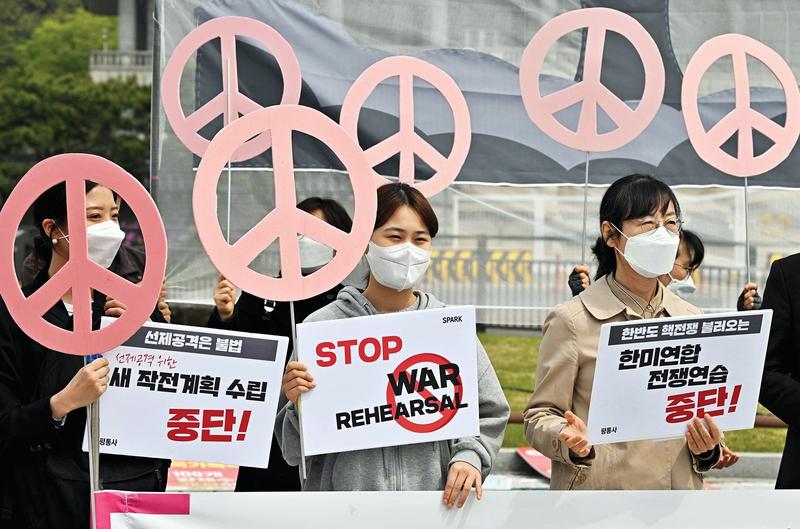 Anti-war activists hold peace signs during a protest in Seoul on April 18 against joint military exercises between South Korea and the United States. (JUNG YEON-JE / AFP)
Anti-war activists hold peace signs during a protest in Seoul on April 18 against joint military exercises between South Korea and the United States. (JUNG YEON-JE / AFP)
Biological laboratories of the United States military in South Korea endanger the lives of local people, say experts calling for an end to the facilities and their experiments.
“The fact that (these) facilities are located in Busan Port, where the population is dense, in a form the Korean government is not aware of at all, poses a risk of catastrophic and widespread civilian damage,” Woo Hee-jong, a professor at the College of Veterinary Medicine at Seoul National University, told China Daily, citing the example of the 1984 Bhopal gas tragedy in India that killed thousands of people.
Enraged at the opaqueness of the US biological labs, civic groups and residents have taken to the streets.
Jeon Wi-bong, director of a group campaigning to shut down the biolabs in Busan, said there are about 20 schools and 30 apartment complexes, as well as major transport links, located within a 3-kilometer radius of the base.
In contrast, the US army set up its Dugway biolab in the middle of the Utah desert, Joen noted. In 1968, about 6,000 sheep died in the Dugway area, and the Salt Lake Tribune newspaper later reported, citing a report that was declassified in 1978, that the nerve agent VX was found in the area.
Although the US government has claimed the South Korean biolabs were set up for biosurveillance purposes, past evidence has shown otherwise.
“JUPITR ATD is entirely part of the US military biowarfare-related overseas military strategy,” said Woo.
JUPITR ATD is the acronym for the biolab project jointly operated by the US and South Korean armed forces, or US Forces Korea (USFK).
Jeon said the USFK has deceived South Korean people. For example, when people protested against the JUPITR facility in Busan in 2016, the US asserted that no biochemical samples will be brought to the base. Yet it was found that relevant samples were carried in dozens of times between 2017 and 2019, he said.
In 2015, the Pentagon confirmed that it “inadvertently” sent live anthrax samples to a US lab in South Korea. A joint South Korea-US investigation found out later in the same year that samples of the lethal bacteria had been sent to South Korea 16 times since 2009, as part of the lab’s bio-defense tests.
Jeon told Xinhua News Agency that, despite the attention surrounding the 2015 live anthrax samples delivery, the USFK expanded biological labs into Busan Port’s Pier 8 in 2016.
Jeon said the JUPITR facility violates the Biological Weapons Convention, signed by over 180 nations including South Korea and the US, and can be investigated by the United Nations Security Council if the South Korean government files a complaint.
“Under Article 9 of SOFA, military cargo delivered to the USFK bases is not subject to customs inspection. As a result, the Korean people will not know anything even if the biochemical samples are delivered to these bases,” said Jeon. SOFA refers to the Status of Forces Agreement, the military pact between the US and South Korea.
Woo, from Seoul National University, said the “unilateral and unequal” SOFA needs to be renegotiated for the South Korean government to at least secure information on the import of hazardous substances into the country.
“Lax regulations and the (South) Korean government’s reluctance to protest against it created an easy, favorable environment (for the US military) to carry out experiments with germs here,” said Lee Jang-hie, an emeritus professor at the law school of the Hankuk University of Foreign Studies.
From April 4 to 10, a group of activists traveled across South Korea, staging a series of rallies calling for the end of joint military exercises between South Korea and the US as well as the closure of USFK’s bioweapon labs.
“A person in charge of US military biological labs said Korea is friendly to operate such labs. I got infuriated when I heard that, because it belittles my country severely,” said Choi Won-seok, who joined the activists’ tour near Busan Port’s Pier 8.
On April 5, Kim Moon-jun, a professor from Kongju National University, submitted a petition to President-elect Yoon Suk-yeol’s transition committee, demanding the return of the land occupied by the Yongsan US base in Seoul and the revision of the “unequal” SOFA, news outlet Incheon Ilbo reported.
“The USFK has been operating anthrax biolabs and released toxic pollutants such as dioxin,” Kim said in the petition. He said the USFK’s biolabs should be immediately shut down.
Xinhua contributed to this story.


